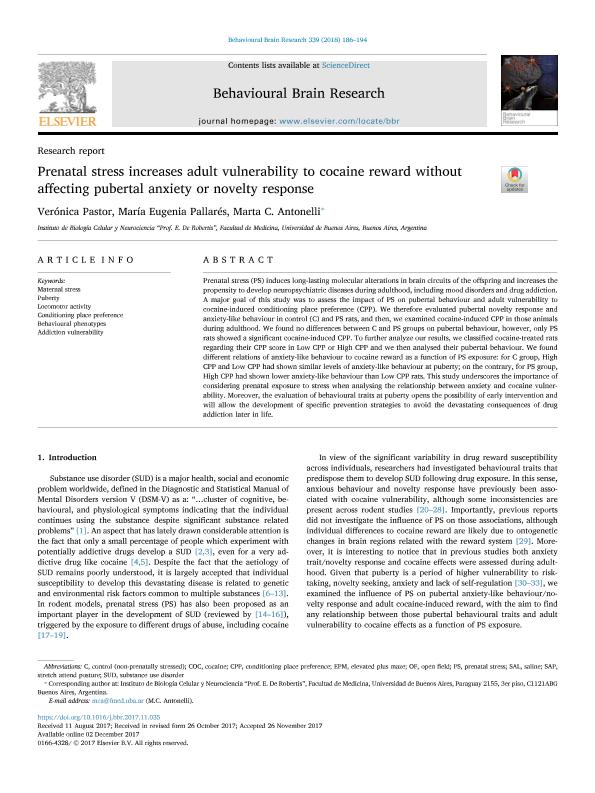Mostrar el registro sencillo del ítem
dc.contributor.author
Pastor, Verónica

dc.contributor.author
Pallares, Maria Eugenia

dc.contributor.author
Antonelli, Marta Cristina

dc.date.available
2019-11-25T21:26:05Z
dc.date.issued
2018-02
dc.identifier.citation
Pastor, Verónica; Pallares, Maria Eugenia; Antonelli, Marta Cristina; Prenatal stress increases adult vulnerability to cocaine reward without affecting pubertal anxiety or novelty response; Elsevier Science; Behavioural Brain Research; 339; 2-2018; 186-194
dc.identifier.issn
0166-4328
dc.identifier.uri
http://hdl.handle.net/11336/90371
dc.description.abstract
Prenatal stress (PS) induces long-lasting molecular alterations in brain circuits of the offspring and increases the propensity to develop neuropsychiatric diseases during adulthood, including mood disorders and drug addiction. A major goal of this study was to assess the impact of PS on pubertal behaviour and adult vulnerability to cocaine-induced conditioning place preference (CPP). We therefore evaluated pubertal novelty response and anxiety-like behaviour in control (C) and PS rats, and then, we examined cocaine-induced CPP in those animals during adulthood. We found no differences between C and PS groups on pubertal behaviour, however, only PS rats showed a significant cocaine-induced CPP. To further analyze our results, we classified cocaine-treated rats regarding their CPP score in Low CPP or High CPP and we then analysed their pubertal behaviour. We found different relations of anxiety-like behaviour to cocaine reward as a function of PS exposure: for C group, High CPP and Low CPP had shown similar levels of anxiety-like behaviour at puberty; on the contrary, for PS group, High CPP had shown lower anxiety-like behaviour than Low CPP rats. This study underscores the importance of considering prenatal exposure to stress when analysing the relationship between anxiety and cocaine vulnerability. Moreover, the evaluation of behavioural traits at puberty opens the possibility of early intervention and will allow the development of specific prevention strategies to avoid the devastating consequences of drug addiction later in life.
dc.format
application/pdf
dc.language.iso
eng
dc.publisher
Elsevier Science

dc.rights
info:eu-repo/semantics/openAccess
dc.rights.uri
https://creativecommons.org/licenses/by-nc-sa/2.5/ar/
dc.subject
ADDICTION VULNERABILITY
dc.subject
BEHAVIOURAL PHENOTYPES
dc.subject
CONDITIONING PLACE PREFERENCE
dc.subject
LOCOMOTOR ACTIVITY
dc.subject
MATERNAL STRESS
dc.subject
PUBERTY
dc.subject.classification
Neurociencias

dc.subject.classification
Medicina Básica

dc.subject.classification
CIENCIAS MÉDICAS Y DE LA SALUD

dc.title
Prenatal stress increases adult vulnerability to cocaine reward without affecting pubertal anxiety or novelty response
dc.type
info:eu-repo/semantics/article
dc.type
info:ar-repo/semantics/artículo
dc.type
info:eu-repo/semantics/publishedVersion
dc.date.updated
2019-10-23T14:38:15Z
dc.journal.volume
339
dc.journal.pagination
186-194
dc.journal.pais
Países Bajos

dc.journal.ciudad
Amsterdam
dc.description.fil
Fil: Pastor, Verónica. Consejo Nacional de Investigaciones Científicas y Técnicas. Oficina de Coordinación Administrativa Houssay. Instituto de Biología Celular y Neurociencia "Prof. Eduardo de Robertis". Universidad de Buenos Aires. Facultad de Medicina. Instituto de Biología Celular y Neurociencia; Argentina
dc.description.fil
Fil: Pallares, Maria Eugenia. Consejo Nacional de Investigaciones Científicas y Técnicas. Oficina de Coordinación Administrativa Houssay. Instituto de Biología Celular y Neurociencia "Prof. Eduardo de Robertis". Universidad de Buenos Aires. Facultad de Medicina. Instituto de Biología Celular y Neurociencia; Argentina
dc.description.fil
Fil: Antonelli, Marta Cristina. Consejo Nacional de Investigaciones Científicas y Técnicas. Oficina de Coordinación Administrativa Houssay. Instituto de Biología Celular y Neurociencia "Prof. Eduardo de Robertis". Universidad de Buenos Aires. Facultad de Medicina. Instituto de Biología Celular y Neurociencia; Argentina
dc.journal.title
Behavioural Brain Research

dc.relation.alternativeid
info:eu-repo/semantics/altIdentifier/url/https://www.sciencedirect.com/science/article/pii/S0166432817313384
dc.relation.alternativeid
info:eu-repo/semantics/altIdentifier/doi/https://doi.org/10.1016/j.bbr.2017.11.035
Archivos asociados
